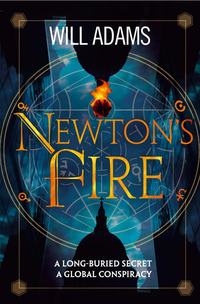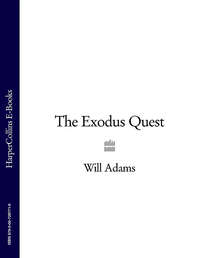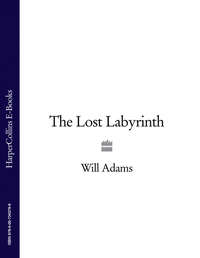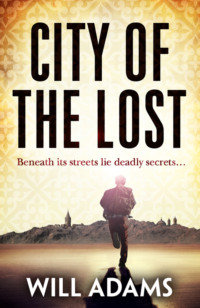
Полная версия
The Alexander Cipher
The officer had noticed the approaching headlights too. His jaw tightened as he came to his decision. He tossed the passport onto the passenger seat, then signalled his men to stand aside. ‘Get out of Egypt,’ he advised. ‘It’s no longer safe for you.’
Knox let out a long breath. ‘I’m leaving tonight.’
‘Good. Now go before I change my mind.’
Knox put the Jeep into gear, accelerated away. His hands began shaking wildly as his body flooded with the euphoria of escape. He held himself back until he was a distance down the road, then he whooped and punched the air. He’d done a stupid, reckless thing, but it looked as though he’d got away with it.
III
Nessim, Hassan al-Assyuti’s head of security, arrived in Knox’s Sharm backpacker hotel to find the middle-aged concierge snoring raucously behind his desk. He came awake with a strangled shriek when Nessim slammed down the wooden access hatch.
‘Knox,’ said Nessim. ‘I’m looking for Daniel Knox.’
‘He’s not here,’ said the concierge, breathing heavily.
‘I know he’s not here,’ said Nessim coldly. ‘I want to see his room.’
‘But it’s his room!’ protested the concierge. ‘I can’t just show it to you.’
Nessim reached into his jacket pocket for his wallet, making sure that the concierge caught a glimpse of his shoulder holster while he was at it. He took out fifty Egyptian pounds and set them down on the counter. ‘This is me asking nicely,’ he said.
The concierge licked his lips. ‘Just this once, I suppose.’
Nessim followed the fat man upstairs, still brooding on what had happened on the boat, the humiliation of being bested by some beach-bum foreigner. At first, he’d thought that Knox would be easy to track down, but it wasn’t proving that simple. He’d had word back from a contact in the army that Knox had somehow bluffed his way through a checkpoint. When he’d heard about that, he’d felt a spike of intense anger and frustration. How simple it might have been! But he knew better than to make waves. Only a fool took on the army in Egypt; and Nessim wasn’t a fool.
The concierge unlocked and opened Knox’s door, looking around nervously lest other guests see what was happening. Nessim went inside. He had one night to capture Knox, and he had that only because Hassan was on morphine to manage his pain. When he woke in the morning he’d demand to know what progress had been made.
He’d want Knox.
Nessim fingered the shabby clothes hanging in the wardrobe, checked the side-pockets of the red canvas bag in the bottom, crouched to inspect the books lined up on the floor against the walls. A few comic novels and thrillers, but mostly academic works on Egypt and archaeology. There were CDs, too, some music, others for his laptop. He picked up a cone-bound document. The front page read, in both English and Arabic:
Mallawi Excavation First Season Notes Richard Mitchell and Daniel Knox
He flipped through it. Text and photographs of an excavation near an ancient Ptolemaic settlement a few kilometres from Mallawi in Middle Egypt. He put it back thoughtfully. Why would an Egyptologist be working as a dive instructor in Sharm? He checked a few more documents. Maps and photographs of reefs systems, as best as he could make out. He took the canvas bag from the wardrobe and packed all of Knox’s documents inside. Then he packed up Knox’s laptop too, and his work-related CDs and floppy disks. In the top drawer of Knox’s desk, he found photocopies of his passport and driver’s licence, presumably in case he lost the originals; and a strip of colour passport-sized photographs, no doubt for the myriad documents foreigners needed to work in Sinai. He scooped these up and tucked them away in his jacket pocket. Then he picked up the canvas bag and laptop to take away with him. The concierge gave a little whimper.
‘Yes?’ asked Nessim. ‘Is something the matter?’
‘No,’ said the concierge.
‘Good. A word of advice. I’d clear the rest of his stuff out, if I were you. I very much doubt your friend will be coming back any time soon.’
‘No?’
‘No.’ Nessim handed the man one of his business cards. ‘But call me if he does.’
FIVE
I
The mosquitoes were in a malevolent mood that evening. Gaille had spiked two smouldering green coils onto their tin stands, had buttoned her white chemise tight around her throat and wrists, tucked her long trousers into socks, then sprayed all her remaining exposed skin to a shine with repellent; yet these gossamer fiends still found a way to feed off her, then boast of it afterwards with that infuriating trumpeting of theirs, retreating to the high hotel ceiling well out of range of reprisal even when she stood on a chair. Whatever had happened to the notion of sisterhood? There it was again, that gloating buzz behind her ear. She slapped at her neck but only as a gesture to punish herself for being so easily caught. The damage was done. The side of her right hand began to pulse and redden. Her mouse hand was an easy target as she typed up these damned excavation notes every night. She paused momentarily, glanced at her window. Just one night off wouldn’t hurt. A cold beer and a little conversation. But if Elena caught her in the bar—
Her door opened without warning and Elena herself strode in as though she owned the place. She had no regard for anyone else’s privacy, but heaven help you if you dared so much as knock upon her door without first giving two weeks’ written notice!
‘Yes?’ asked Gaille.
‘I’ve just had a phone call,’ said Elena. She squinted belligerently at Gaille, as though she found herself at a disadvantage and expected Gaille to make the most of it. ‘Ibrahim Beyumi. You know him? He’s head of the Supreme Council in Alexandria. Apparently he’s found a necropolis. He thinks part of it may be Macedonian. He wants me to check it out with him. He also said he was putting together a team for possible excavation, and asked if I could provide specialist support. I had to remind him I had my own excavation to run. Still, I mentioned you were available.’
Gaille frowned. ‘He needs support with languages?’
‘It’s an emergency excavation,’ snorted Elena. ‘The job is to record, remove, process and store. Translation will come later.’
‘Then—’
‘He needs a photographer, Gaille.’
‘Oh!’ Gaille felt bewildered. ‘But I’m not a photographer.’
‘You’ve got a camera, haven’t you? You’ve been taking pictures for us, haven’t you? Are you telling me they’re no good?’
‘I only took them because you asked me to—’
‘So it’s my fault now, is it?’
Gaille asked plaintively: ‘What about Maria?’
‘And who will we be left with? Are you claiming to be as good a photographer as she is?’
‘Of course not.’ The only reason she’d brought her camera was to photograph badly faded ancient ostraca, so that she could use her laptop’s image software to make the writing clearer. ‘I just said I’m not a—’
‘And Maria doesn’t speak Arabic or English,’ pointed out Elena. ‘She’d be useless to Ibrahim, and all on her own. Is that what you want?’
‘No. All I’m saying is—’
‘All you’re saying is!’ mocked Elena spitefully, imitating her voice.
‘Is this about what happened earlier?’ asked Gaille. ‘I told you, I didn’t see anything down there.’
Elena shook her head. ‘This has nothing to do with that. It’s very simple. The head of the Supreme Council in Alexandria has asked for your help. Do you really want me to tell him you refused?’
‘No,’ replied Gaille miserably. ‘Of course not.’
Elena nodded. ‘We’re doing an initial survey first thing tomorrow morning. Make sure you’re packed and ready to leave at seven.’ She took a look round Gaille’s messy hotel bedroom, shook her head in exaggerated disbelief, then slammed the door behind her as she left.
II
It was a wrench for Knox to abandon his Jeep in long-term parking. It had been his one constant companion since he’d been in Egypt. Eight hundred thousand already on the clock, and more left beneath the bonnet. You grew to love a car when it had done that well for you. He left his keys and the car-park receipt beneath the seat. He’d give one of his Cairo friends a call, see if they wanted it.
The airport was busy. There was so much refurbishment going on, everything was squeezed into half the space. Knox pulled his baseball cap down over his eyes, though it seemed unlikely that Hassan’s people would be ahead of him. He had a choice of flights. Many planes arrived in Egypt late at night, turning round to reach their home airports around dawn. He wandered along the bank of check-in desks. London? Screw that. When you’d fucked up your life, the last thing you wanted was to be reminded of it by the success of old friends. Athens was out too. When he’d lost his marbles in the wake of family tragedy, Greece had been put off-limits to him. Stuttgart? Paris? Amsterdam? The thought of such places depressed him horribly.
A dark-haired woman in the queue for Rome caught his eye and smiled coyly. It seemed as good a reason as any. He went to the enquiries counter to see if there were tickets. The man in line ahead of him was moaning about freight surcharges for his computer. Knox tuned out. Go home, that checkpoint officer had urged. But Egypt was his home. He’d lived here ten years. He’d grown to love it, for all its heat, discomfort, chaos and clam-our. He loved the desert most of all, its searing clean lines, its extraordinary gift of solitude, the kaleidoscopic sunsets and the chill mists in the dune valleys in the moments before dawn. He loved the hard labour of excavation, the thrill of potential discovery, that glorious kick it gave you getting out of bed each morning. Not that he ever got the chance to excavate any more.
The man ahead of him finally paid up. Knox stepped forward, fluttery with nerves. If he was going to have problems, this was where he’d find out. The booking clerk smiled blandly. He asked about seats; she assured him there were plenty. Knox handed across his passport and a credit card. She tapped keys, glanced up. ‘Mi Scusi un momento.’ She took his passport and card, vanished through a door at the back of her booth. He leaned forward to see what it said on her screen. He saw nothing to alarm him. He looked around the concourse. Everything appeared normal.
The clerk returned. She wouldn’t quite meet his eye. She kept his passport and credit card in her hand, fractionally out of his reach. He glanced around again. Teams of security guards appeared almost simultaneously through doors at either end of the concourse. Knox lunged forward to snatch his passport and card from the startled clerk, then turned, ducked his head, and walked briskly away, his heart pumping wildly. To his left, a security guard yelled. Knox abandoned pretence. He raced for the exit. The doors were automatic, but they slid open so slowly that he had to turn shoulder-first and still crashed into them, forcing his way through, spinning round. A guard on duty outside took his rifle from his shoulder so hastily that he fumbled it clattering to the floor.
Knox fled left, away from the bright lights of the terminal building into the darkness beyond. He vaulted a rail, ran down a steep embankment to a poorly lit airport bus stop, leaped between a group of young travellers sitting on their backpacks, smashed into the wall of an underpass, grazing his palm. Two uniformed janitors sharing a cigarette looked at him in astonishment as he ran between them, the whiff of their black tobacco catching in his throat. He turned left, sprinting hard, ignoring the shouting and the sirens. There were trees to his left; he ducked into their cover, running for another ten minutes until he couldn’t manage any more and came to a stop, bent double, his hands on his knees, heaving for air. Car headlights were slowly patrolling the roads, flashlights sweeping through the trees. The sweat on his shirt cooled; he shivered as he caught the scent of himself. This was bad. This was truly fucking awful. If the police got to him, it wouldn’t matter if he could prove his case, Hassan would already have him by the balls. He thought through his options. The air and sea ports were clearly on alert. Border crossings would have his photo. You could get any documents in the world forged in Cairo, but Hassan’s reach was long. He’d soon know Knox was in Cairo, and he’d put out the word. No. He needed to get away as quick as possible. He could flag down a taxi or a bus, but the drivers would remember him. Trains were often packed with soldiers and police. Better to risk going back for his Jeep.
There was shouting from his left, a single gunshot. Knox flinched and ducked. It took him a moment to realise they were shooting at shadows. He had his breath back now, and his bearings. He crouched and kept moving until he reached the perimeter wire fence of long-term parking, high but not barbed. He climbed it by a concrete post, dropped down the other side, the joints of his fingers raw from the thin mesh. He ran low between the pools of light and the ranks of parked cars. The place was deserted. Departing passengers were already in the terminal; arrivals had long-since driven off. He drove up to the booth, handed money to a sleepy attendant. The barrier lifted.
Blue police lights flashed away to his left as he pulled out onto the main road. He turned right, instead, heading towards Cairo. The lights shrank and then disappeared from his mirror. Police cars with flashing lights hurtled past on the other side of the highway. He found that he’d stopped breathing, had to make himself start.
Where the fuck was he going to go now? He couldn’t stay in Cairo. But he needed to avoid checkpoints too. That cut out Sinai, the Western Desert and the south. Alexandria, then. It was just three hours north, and of all Egypt’s cities, Knox liked it most. He had friends there too, so he could avoid hotels. But he was a fugitive; he couldn’t inflict himself on just anyone. He needed someone who’d believe in him, someone with strong nerves, who relished a little transgression from time to time, just to keep the blood pumping. Put like that, there was only one contender. Knox felt his spirits lifting for the first time in hours. He stamped down his foot and roared north.
SIX
I
‘Mais attends!’ yelled Augustin Pascal at whatever bastard was pounding at his door. ‘J’arrive! J’arrive!’ He clambered across the naked girl lying with her face down between his pillows. With that long, wavy, tawny hair, it looked like Sophia. He lifted her mane to make sure. Shit! Shit! He’d been excited for a week at the prospect of nailing her, and now he’d gone and wasted it while too drunk to remember.
A terrible thing, growing old.
The pounding on the door began again, resonating with the demolition works inside his skull. He checked his alarm clock. Five thirty! Five fucking thirty! But this was unbelievable! ‘Mais attends!’ he yelled again.
He kept emergency bottles of water and pure oxygen on his bedside table. He alternated long swallows from the one with deep breaths from the other, until he felt able to stand without keeling over. He wrapped a ragged towel around his waist, lit a cigarette, went to his front door. Knox was standing there.
‘The fuck do you want?’ demanded Augustin. ‘You know what fucking time this is?’
‘I’m in trouble,’ said Knox simply. ‘I need help.’
II
Ibrahim felt in tremendous spirits as he drove through Alexandria. The sun had only just risen, but he’d been too excited to stay in bed. He’d had a dream during the night. No. That wasn’t quite right. He’d been lying there half awake, waiting for his alarm to sound, when he’d suddenly been overwhelmed by a sense of exquisite and intense wellbeing. He couldn’t shake off the idea that he was on the verge of something momentous.
He pulled up outside Mohammed’s address. It was a wretched-looking place, a tall apartment block with pockmarked and discoloured walls, its front doors broken and hanging loose, intestinal wires spilling out of the intercom. Mohammed was already waiting in the lobby. His eyes lit up when he saw Ibrahim’s Mercedes and he walked proudly and slowly across, turning around as he did so, like an actor or a sportsman milking their time upon the stage, wanting as many of his friends and neighbours as possible to see him climb in.
‘Good morning,’ said Ibrahim.
‘We travel in style, then,’ said Mohammed, pushing back the passenger seat as far as it would go to accommodate his legs, yet still struggling to fit.
‘Yes.’
‘My wife’s very excited,’ said the big man. ‘She’s convinced we have found Alexander.’ And he glanced slyly at Ibrahim to gauge his reaction.
‘I doubt it, I’m afraid,’ said Ibrahim. ‘Alexander was buried in a huge mausoleum.’
‘And this isn’t part of it?’
Ibrahim shrugged. ‘It’s very unlikely. It wasn’t just Alexander, you see. The Ptolemies were buried there too.’ He smiled across at Mohammed. ‘They wanted Alexander’s glory to rub off on them. It didn’t work all that well, though. When the Roman Emperor Augustus made his pilgrimage to Alexander’s tomb, the priests asked him if he’d like to see the bodies of the Ptolemies too. You know what he replied?’
‘What?’
‘That he’d come to see a king, not corpses.’
Mohammed laughed loudly. Alexandrians had always enjoyed watching the powerful get taken down a peg or two. Ibrahim was so pleased that he ventured another anecdote. ‘You know Pompey’s Pillar?’
‘Of course. I can see it from my site.’
‘Did you know it had nothing to do with Pompey? No. It was erected in honour of the Emperor Diocletian after he led an expeditionary force here to quash an uprising. He was so angry with the Alexandrians that he vowed to revenge himself upon them until his horse was knee-deep in blood. Guess what happened.’
‘I can’t think.’
‘His horse stumbled and grazed its knees, so that they became covered in blood. Diocletian took this as a sign, and spared the city. His officials put up his pillar and statue in remembrance. But do you know what the Alexandrians did?’
‘No.’
‘They built a statue too. But not to Diocletian. To his horse.’
Mohammed guffawed and slapped his knee. ‘To his horse! I like that!’
They were drawing closer to the city centre. ‘Which way?’ asked Ibrahim.
‘Left,’ said Mohammed. ‘Then left again.’ They paused for a tram. ‘So where was Alexander’s tomb?’ he asked.
‘No one knows for sure. Ancient Alexandria suffered terribly from fires, riots, wars and earthquakes. There was a catastrophic tsunami too. First it sucked away the water from the harbours so that the citizens went out to pick up the fish and valuables just lying there. Then the wave struck. They never stood a chance.’
Mohammed shook his head in wonder. ‘I never heard.’
‘No. Anyway, the city fell into ruin and all the great sites became lost, even Alexander’s mausoleum. And we’ve never found it since, though we’ve tried, believe me.’ Countless excavators had tried, including Heinrich Schliemann, fresh from his triumphs at Troy and Mycenae. All had come up empty-handed.
‘You must have some idea.’
‘Our sources agree that it was on the north-east of the ancient crossroads,’ said Ibrahim. ‘The trouble is, we’re not sure where that was. All these new buildings, you see. Two hundred years ago, yes. A thousand years ago, easy. But now …’
Mohammed looked slyly at Ibrahim. ‘People say Alexander is buried beneath the Mosque of the Prophet Daniel. They say he’s in a golden casket.’
‘They’re wrong, I’m afraid.’
‘Then why do they say this?’
Ibrahim was quiet for a moment, collecting his thoughts. ‘You know that Alexander appears in the Qu’ran?’ he asked. ‘Yes, as the Prophet Zulkarnein, the two-horned one. Leo the African, a sixteenth-century Arab writer, talked of pious Muslims making pilgrimages to his tomb, and he said it was near the church of St Mark, like the Mosque of the Prophet Daniel. And Arab legends speak of a Prophet Daniel who conquered all Asia, founded Alexandria, and was buried here in a golden coffin. Who else could that be but Alexander? You can certainly see why people might confuse the mosque with Alexander’s tomb. And then a Greek man claimed he’d glimpsed a body wearing a diadem on a throne in the mosque’s vaults. It’s a very seductive idea. There’s only one problem with it.’
‘Yes?’
‘It’s completely wrong.’
Mohammed laughed. ‘You’re sure?’
‘I’ve searched the vaults myself,’ nodded Ibrahim. ‘Believe me, they’re Roman, not Ptolemaic. Five or six hundred years too late. But the idea has stuck, not least because our best map of ancient Alexandria marks the mausoleum very near the mosque.’
‘There you are, then!’
‘It was made for Napoleon the Third,’ said Ibrahim. ‘He needed information on ancient Alexandria for his biography of Julius Caesar, so he asked his friend Khedive Ismail. But there was no reliable map at the time, so Khedive Ismail commissioned a man called Mahmoud el-Falaki to make it.’
‘Research is certainly easier if you’re an emperor.’
‘Quite,’ agreed Ibrahim. ‘And it’s a really fine piece of work. But not perfect, I’m afraid. He fell for the old legends too, because he marked Alexander’s tomb near the mosque, and all the modern guide books and histories now reprint it, keeping the myth alive. The poor imam is constantly being pestered by tourists hoping to find Alexander. But they won’t find him there, believe me.’
‘Where should they be looking?’
‘On the north-east side of the old crossroads, like I said. Near the Terra Santa cemetery, probably. A little north-west of the Shallalat Gardens.’
Mohammed was looking downcast. Ibrahim patted his forearm. ‘Don’t give up hope just yet,’ he said. ‘There’s something I haven’t told you.’
‘What?’
‘I haven’t told anyone. I don’t want rumours to start, you know. And you mustn’t get your hopes up. You really mustn’t.’
‘Tell me.’
‘Alexander didn’t have just one tomb in Alexandria. He had two.’
‘Two?’
‘Yes. The Soma, the great mausoleum I told you about, was built in around 215 BC by Ptolemy Philopater, the fourth of the Ptolemaic kings. But, before that, he had a different tomb, more in the traditional Macedonian style. More, as it were, like the one you and your men found yesterday.’
Mohammed looked wonderingly at him. ‘You think this is what we have found?’
‘No,’ said Ibrahim gently. ‘I really don’t. This was Alexander, remember. The Ptolemies would surely have built something spectacular for him.’ Not that they knew what. They didn’t even know when Alexander’s body had been brought here from Memphis. The modern consensus was 285 bc, nearly forty years after his death, though no one had satisfactorily explained why the transfer should have taken so long. ‘We believe that his body would have been on display, so it’s unlikely we’ll find it deep underground. Besides, Alexander was worshipped as a god for centuries. The city authorities would never have tolerated even his former tomb being turned into a common necropolis.’
Mohammed looked crestfallen. ‘Then why did you say that it might be?’
‘Because this is archaeology,’ grinned Ibrahim. ‘You never know for sure.’
And there was something else too, though nothing he felt like sharing. It was that ever since he’d been a small boy, listening to his father murmur him to sleep with tall stories about the founder of this great city, he’d had a sense of destiny: one day he’d play his part in the rediscovery of the tomb of Alexander. This morning, as he’d lain awake in bed, he’d had a reprise of that feeling, a conviction that the time was upon him. And, for all his intellectual misgivings, he was sure in his heart that it had something to do with the tomb they were on their way to inspect.








